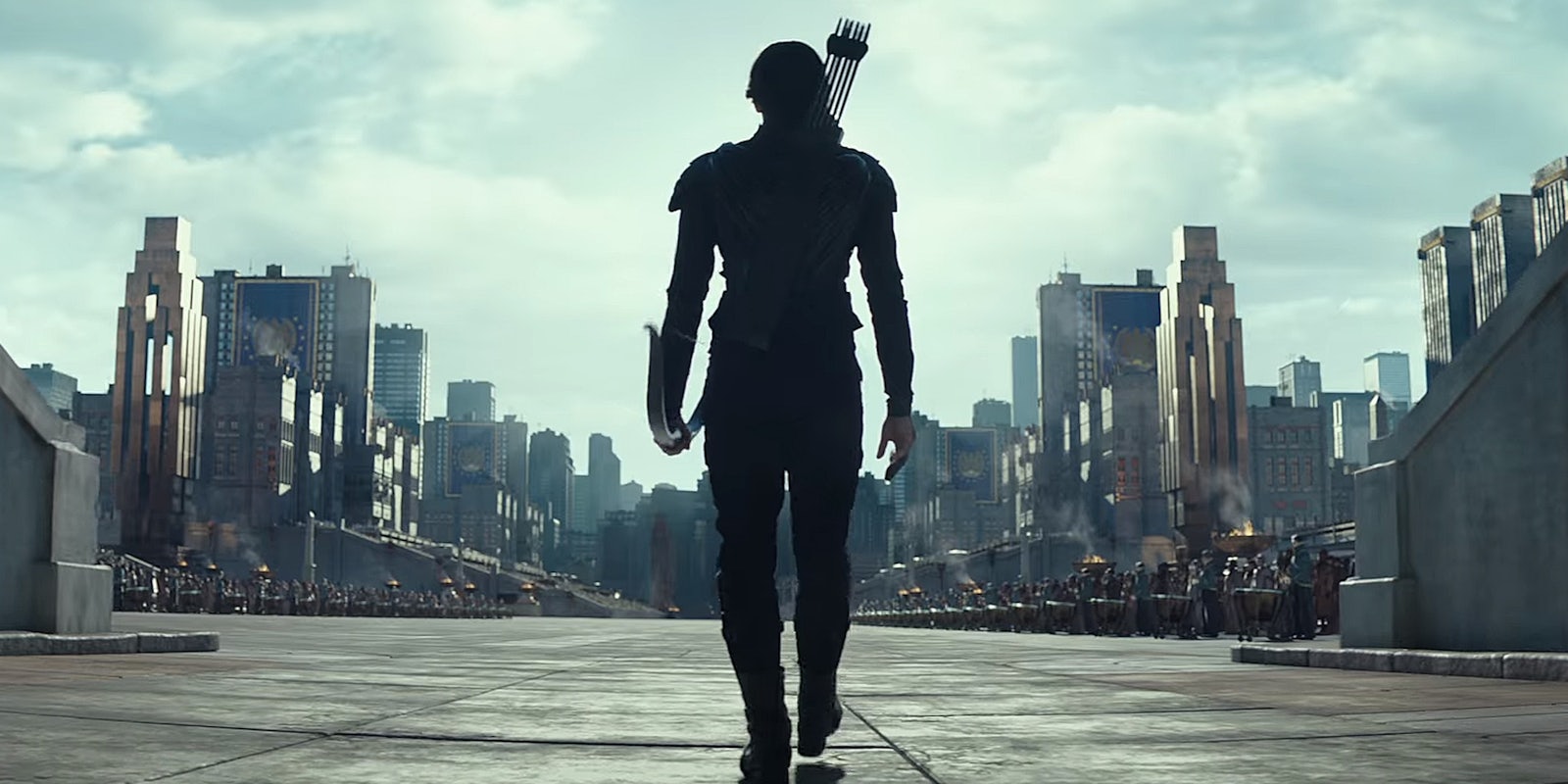The Hunger Games movies made Jennifer Lawrence a household name and forced critics to take the Young Adult film genre seriously. So with Mockingjay Part II arriving this week, how else has the Hunger Games franchise influenced our cultural landscape?
The impact reaches farther and is more varied than you might expect. Suzanne Collins’ bestseller and subsequent blockbuster phenomenon has affected everything from ad campaigns to real-life political unrest. Here are just some of the ways Hunger Games has had a notable impact on our world.
1) Archery
Archery lessons have seen a surge in popularity since the start of the Hunger Games franchise, especially among girls. Helped along by Marvel’s Hawkeye and Merida from the Disney movie Brave, Katniss has inspired countless kids to take up this ancient fighting technique. The company behind Nerf guns even launched a range of kid-safe crossbows for girls, called Nerf Rebelle. We doubt that would have happened a few years ago.
2) Oddly dissonant ad campaigns
One of the key themes of the Hunger Games franchise is media manipulation, with Katniss becoming an unwilling symbol of a revolution she never meant to inspire. Her public image is crafted first by the Capitol and then by her allies among the rebel forces, but the film’s real-world marketing failed to achieve the same level of finesse.
Subway sandwiches may have been the weirdest Hunger Games tie-in product, considering the fact that Katniss has to break the law to feed her own family. But who could forget Cover Girl’s Hunger Games makeup collection, which allowed you to imitate the vain, oppressive Capitol citizens? Other Hollywood franchises should really learn from these mistakes.
3) Female-led sci-fi and fantasy movies
This may sound a little optimistic considering Hollywood’s ongoing problems with sexism, but the Hunger Games really did make a difference. Katniss Everdeen is now cited alongside Sarah Connor of Terminator and Ellen Ripley of Alien as one of the greatest female action heroes of all time, and her popularity has led to movies like Divergent and Mortal Instruments getting the green light.
4) Viral marketing transmedia campaigns for movies
Though the cross-platform literacy of promotional campaigns for properties like Marvel films and The Martian are now commonplace, it was only a few years ago that film franchises were still struggling to integrate high-quality multi-platform storytelling with regular marketing buzz. By drawing on the innately social-media-friendly nature of the storyline, The Hunger Games’ viral marketing campaign became the model for other films and marketing campaigns to follow. Thanks to The Hunger Games, we don’t have to wait until release date to start enjoying the narrative.
5) A wave of Young Adult Dystopia
Just as Twilight ignited the demand for erotica and “New Adult” literature, The Hunger Games led to a wildfire of gritty young adult dystopia that has yet to dwindle. From The Hunger Games sprang forth The Maze Runner and Divergent along with a rushed film adaptation of the classic dystopia The Giver. Patrick Kness’s popular adult dystopic trilogy Chaos Walking is getting a screenplay by Charlie Kaufman, while Edgar Wright is producing an adaptation of the bestseller Grasshopper Jungle. And there are even more YA dystopic adaptations on the way, like the upcoming movie The 5th Wave, the hit trilogy Matched, and The Forest of Hands and Teeth, featuring Maisie Williams. Even Disney’s Tomorrowland got a dystopic infusion. And with The Hunger Games still featured on bestseller lists, don’t expect the craze to die down any time soon.
https://www.youtube.com/watch?v=0G0C-vMHcQY
6) Amandla Stenberg
Sure, we would have had Amandla Stenberg, the actress, no matter what. But Stenberg, just 13 when her casting as Rue broke the angry racist side of the Internet, was not only thrust into the spotlight, but she had to bear the cultural impact of a story that dared to make a political point over the body of a dead black child. Just as her character became an innocent victim of the sadistic Hunger Games, Stenberg was subject to a torrential onslaught of racism and harassment—and in response she quickly evolved into one of the most eloquent and educated Black voices on social media. Would we have gotten Amandla Stenberg, one of Time’s most influential teens, a proud and outspoken feminist and advocate for #Blacklivesmatter, if not for Rue? Thankfully, we were lucky enough to get both.
7) The three-fingered salute
https://www.youtube.com/watch?v=0Y1bsDB4VV8
In Suzanne Collins’ novel, the three-fingered salute is a symbol of remembrance that evolves into a symbol of rebellion. In real life, Hunger Games fans all over the world have used the sign exactly the way their fictional counterparts used it—as a passive show of resistance and civil protest. In Hong Kong, protesters have flashed the sign in support of democracy; in Thailand, citizens were arrested and screenings of the Hunger Games franchise banned after the symbol became so popular among protesters that it was declared illegal. The far-reaching relevance of Katniss’ fight for freedom is so current that the Harry Potter Alliance has successfully launched the #MyHungerGames campaign two years running. Each year, it has rapidly filled with fans throwing the three-fingered salute—a reminder that the odds aren’t always in their favor.
Screengrab via The Hunger Games/YouTube


